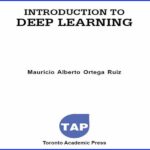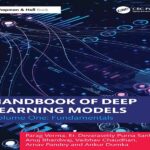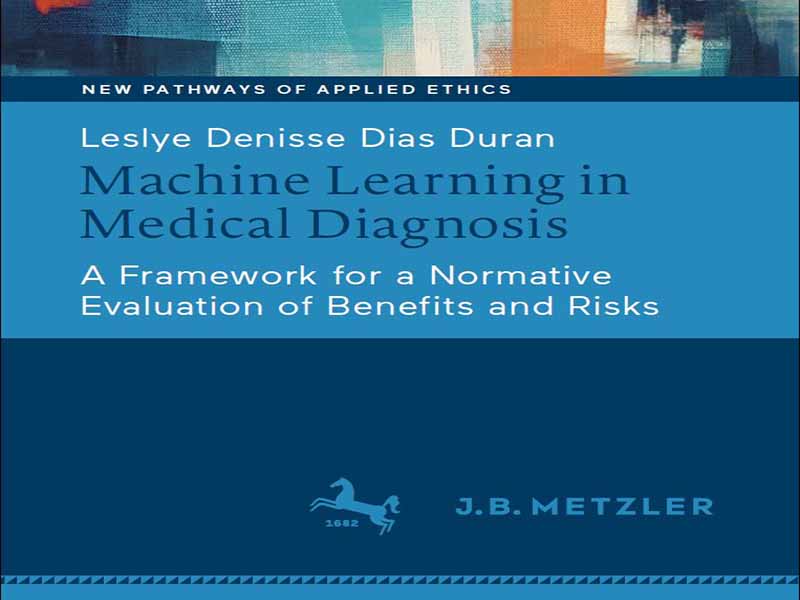- عنوان کتاب: Machine Learning in Medical Diagnosis -A Framework for a Normative Evaluation of Benefits and Risks
- نویسنده: Leslye Denisse Dias Duran
- حوزه: یادگیری ماشین
- سال انتشار: 2025
- تعداد صفحه: 259
- زبان اصلی: انگلیسی
- نوع فایل: pdf
- حجم فایل: 1.72 مگابایت
نقش اخلاق در زمینههای کاربردی چیست؟ این شاید یکی از اولین سوالاتی باشد که کسی که در حوزه اخلاق کاربردی کار میکند با آن مواجه میشود و اغلب پاسخ به آن دشوار است. در حالی که سایر رشتهها ممکن است تعاریف و مرزهای کم و بیش سرراستی داشته باشند، اخلاق کاربردی در تقاطع سایر رشتهها یافت میشود، که معمولاً به این معنی است که قبل از اینکه بتوان معنای کار اخلاقی را توضیح داد، باید به جزئیات آنها پرداخت. اخلاق کاربردی رشتهای در حوزه فلسفه است. این فقط توصیف چالشهای اخلاقی در زمینههای عینی نیست، و نه فقط شفافسازی مفهومی با دقت فلسفی. هر دو وظیفه را میتوان در کار یک متخصص اخلاق کاربردی گنجاند، اما کاری که آن را متمایز میکند، ارزیابی هنجاری ملاحظات با اهمیت اخلاقی در یک زمینه خاص است.
ظهور فناوریهای دیجیتال مانند هوش مصنوعی (AI)، پیامدها و پیامدهای آنها مواردی هستند که این نوع تأمل و ارزیابی فلسفی را ایجاب میکنند. آنها سؤالاتی را مطرح میکنند که فراتر از عجله برای رعایت الزامات نظارتی یا ایجاد ساختارهای حاکمیتی داخلی است که تصویر خوبی از شرکت ترسیم میکنند. این سؤالات مستلزم آن است که ما در مورد نحوه درک و رویکرد خود به مسائل دارای اهمیت اخلاقی تأمل کنیم. آیا این فناوریها به ما در انجام تعهدات اخلاقیمان نسبت به دیگران کمک میکنند یا مانع ما میشوند؟ سوالات دیگری در مورد بدهبستانهایی که در نتیجه معرفی این فناوریها در روالهای روزمره خود انجام میدهیم یا خواهیم داد، با ما روبرو هستند. به عنوان مثال، چه مهارتها، عادات یا فرصتهایی را ممکن است به نفع مزایایی که با استفاده از این ابزارها به دست میآیند، کنار بگذاریم؟ انتظار داریم از آن چه چیزی به دست آوریم و آیا ارزشش را دارد؟ در حوزههای کاربردی مانند مراقبتهای بهداشتی، استفاده از سیستمهای هوش مصنوعی مستلزم آن است که در نظر بگیریم چگونه در حال تغییر هستیم و چگونه روشهای ارتباط و پیوند ما با دیگران میتواند تحت تأثیر قرار گیرد. آیا وظایف اخلاقی جدیدی وجود دارد که به دلیل این فناوریها به سایر عوامل مدیون باشیم؟ آیا حقوقی وجود دارد که پدیدار میشوند و نیاز به حمایت دارند؟
با فراگیر شدن روزافزون این فناوریها، به عنوان عاملان اخلاقی در مرکز هر فرآیندی که در آن فعالیت میکنند، ما مسئولیت داریم که عمیقتر در مورد نقش یا عملکردی که باید به آنها اختصاص دهیم، تأثیراتی که میتوانند داشته باشند و راههایی که باید برای مقابله با هرگونه پیامد احتمالی آماده شویم، تحقیق کنیم. این وظایف هنجاری با توسل به ارزش کند شدن، برجسته میشوند. شرکتهای فناوری و توسعهدهندگان در زمینه هوش مصنوعی، سرعتی از توسعه را در پیش گرفتهاند که اغلب زمان کافی برای بررسی خطرات یا معایب بالقوه محصولاتشان در سطوح مختلف را فراهم نمیکند. این امر، توانایی جوامع را برای سازگاری با تغییرات، که در برخی موارد قابل توجه هستند، تحت فشار قرار میدهد و میتواند منجر به احساس خستگی عمومی شود که توجه را از مزایای بالقوه منحرف میکند.
این یک واقعیت است که ادغام هوش مصنوعی در مراقبتهای بهداشتی یکی از امیدوارکنندهترین زمینهها برای تغییر مثبت و منافع اجتماعی محسوب میشود. شرکتها و کارشناسان فنی بیش از یک دهه است که پیشنهاد کردهاند که قابلیتهای فنی سیستمهای هوش مصنوعی میتواند دقت تشخیصی را به طور قابل توجهی بهبود بخشد، تشخیص زودهنگام بیماریها را تسهیل کند و خطای پزشکی را کاهش دهد.1 در حال حاضر، برنامههایی نیز به صورت تجاری تأیید شدهاند که شواهدی از تحقق این وعدهها را از طریق کارآزماییهای بالینی تصادفی نشان دادهاند.2 با این حال، پذیرش سریع این فناوریها هنوز نگرانیهای اخلاقی، فنی و اجتماعی-هنجاری مهمی را ایجاد میکند که نیاز به بررسی دقیق دارند.
What is the role of ethics in applied contexts? This is perhaps one of the first questions that someone working in the field of applied ethics is confronted with, and it is often a difficult question to answer. While other disciplines may have more or less straightforward definitions and boundaries, applied ethics is found at the intersection of other disciplines, which usually means that one has to go into some detail about them before being able to explain the meaning of the ethical work. Applied ethics is a discipline within the field of philosophy. It is not just the description of ethical challenges in concrete contexts, nor is it just conceptual clarification with philosophical rigor. Both tasks can be included in the work of an applied ethicist, but the work that distinguishes it is the normative evaluation of considerations with moral relevance in a particular context.
The emergence of digital technologies like artificial intelligence (AI), their implications and consequences are matters that warrant this kind of philosophical reflection and evaluation. They raise questions that go beyond the rush to comply with regulatory requirements or produce internal governance structures that paint a good company image. These questions require that we reflect upon how we perceive and approach problems of moral significance. Are these technologies going to aid or hinder us to fulfill our moral obligations to others? Other questions confront us about the tradeoffs we are making or will have to make as a result of introducing these technologies in our routines. For instance, what skills, habits or opportunities we might be discarding in favor of the affordances obtained by using these tools? What are we expecting to gain from it, and is it worth it? In areas of application like in healthcare, the use of AI systems demands that we consider how we are changing, and how our ways of relating and connecting with others can be impacted. Are there new moral duties that we owe to other agents because of these technologies? Are there rights that emerge and need protection?
As these technologies become increasingly ubiquitous, as moral agents at the center of any process in which they operate, we have a responsibility to inquire more deeply about the role or function we should assign to them, the effects they can have, and the ways in which we ought to prepare to deal with any potential consequences. These normative tasks are underscored by an appeal to the value of slowing down. Technology companies and developers in the field of artificial intelligence have adopted a pace of development that often does not allow sufficient time to consider the potential risks or drawbacks of their products at different levels. This strains the ability of societies to adapt to the changes, which in some cases are significant, and can lead to a general feeling of fatigue that distracts attention from the potential benefits.
It is a fact that the integration of artificial intelligence in healthcare is con-sidered one of the most promising areas for positive change and societal benefit. Companies and technical experts have suggested for over a decade now that the technical capabilities of AI systems could significantly improve diagnostic accu-racy, facilitate early detection of diseases and reduce medical error1 .Asofnow, there are also applications approved commercially that have demonstrated evi-dence of fulfilling these promises through randomized clinical trials2 .However, the rapid adoption of these technologies still raises critical ethical, technical, and socio-normative concerns that require careful consideration.
این کتاب را میتوانید از لینک زیر بصورت رایگان دانلود کنید:
Download: Machine Learning in Medical Diagnosis





































نظرات کاربران